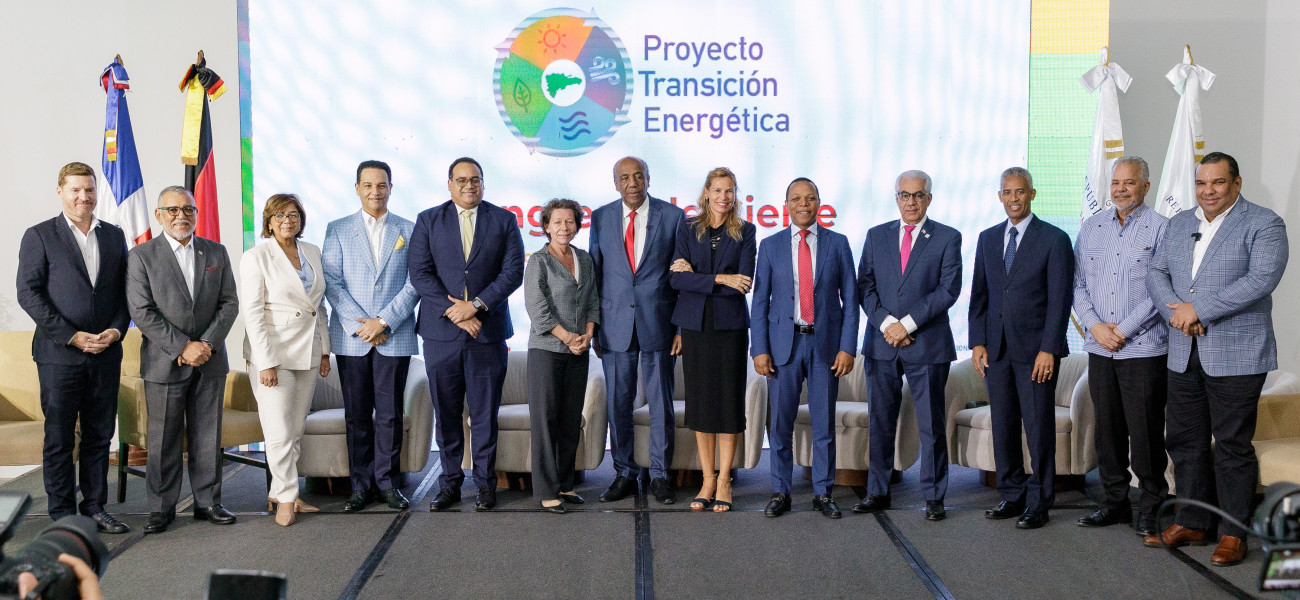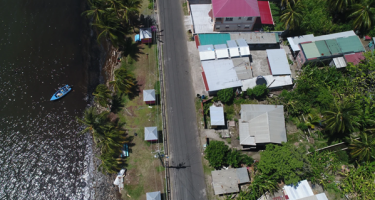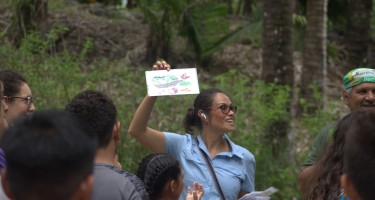The Energy Transition Project was successfully concluded after six years in the Dominican Republic
The Energy Transition Project, the Triangular Cooperations and the Developp Project, successfully concluded after six years of implementation, promoting the insertion of renewable energies in the Dominican Republic through issues related to the modernization of the regulatory framework, financing of renewable energies, integration of variable renewable energies and pilot projects, contributing through studies and capacity building.

Representatives from Germany and high-ranking officials from the electricity sector of the Dominican Republic. GIZ
From 2017 to 2023, various initiatives were implemented that have strengthened the planning and operation of the electricity system, promoting the insertion of renewable energies in the Dominican Republic, through issues concerning the modernization of the regulatory framework, financing of renewable energies, integration of variable renewable energies and pilot projects, contributing through studies and capacity building.
To commemorate these achievements and impacts, on November 30, 2023, the Closing Congress called "The Road to Carbon Neutrality" was held, which brought together representatives from various institutions of the Dominican energy and climate sector, as well as representatives from the private sector, academia and civil society.
The Minister of Energy and Mines, Antonio Almonte, highlighted that "the main impact of the Energy Transition Project in the country has been the capacity building of governmental institutions, that is to say, the one that influences in a great way with the prompt implementation of a process of penetration and expansion of these renewable energy sources and the incorporation of investments for the development of these projects".
The Energy Transition Project was implemented in the Dominican Republic with an investment of more than six million euros.
Some 1,200 professionals from the electricity and climate sectors participated in activities of this initiative: 550 professionals from the electricity sector were trained through 31 national and international trainings and 55 seminars, workshops, exchanges and technological tours, exposing the sector's technicians to new trends related to renewable energies.
Also, 68 presentations were made with international experts; 2 rural electrification projects were implemented and supported, as well as more than 135 publications in national and 30 in international media, and the publication of more than 32 studies with great impact on the regulation and operation of the Dominican electricity sector.
The MEPyD's Vice Minister of International Cooperation, Olaya Dotel, indicated that "the Energy Transition Project has raised the levels of training of public servants on issues such as carbon neutrality and electric mobility". The Project also made possible the implementation of a pilot project in Sabana Real, a community in the province of Independencia, in the border area with Haiti, which was provided with access to electricity and internet for the first time in more than 80 years, through a photovoltaic micro-grid.
The event also marked the closing of the Triangular Cooperation of the Dominican Republic and Germany with Chile, Costa Rica and Cuba, which dealt with issues such as energy planning, electric mobility and the use of solar technologies, with the donation of an electric train to the National Botanical Garden. These cooperations were financed by the German Federal Ministry for Economic Cooperation and Development (BMZ), through the GIZ Regional Triangular Cooperation Fund.
Maike Friedrichsen, Ambassador of the Federal Republic of Germany in the Dominican Republic, highlighted that "during this time, the electricity generation capacity from variable renewable sources has experienced exceptional growth, reaching a total of more than 1000 megawatts, which represents five times more compared to 2017." These achievements are not only testament to the effectiveness of the project, but also to the Dominican Republic's willingness to embrace a more sustainable future.
The meeting provided an opportunity to reflect on the achievements made during the implementation of the project and to mark the remaining challenges. Attendees were able to appreciate the legacy left by this initiative and its fundamental contribution to crystallize the principle of sustainability in the field of energy.
There were also panels on energy policy and the integration of variable renewable energy, as well as advances in the regulatory field. In addition, presentations were made on green hydrogen and the importance of an orderly, fair and inclusive energy transition.
The event was attended by the Minister of Energy and Mines, Antonio Almonte; the German Ambassador in the country, Maike Friedrichsen; the Deputy Minister of Energy, Rafael Gómez; the Deputy Minister of International Cooperation of the MEPyD, Olaya Dotel; and the resident director of the Caribbean Regional Office of GIZ, Verena Blickwede.
The main panel on "Challenges and Opportunities of the Energy Transition" was developed by senior executives of the electricity sector Alfonso Rodríguez, Vice Minister of Energy Saving and Efficiency of the Ministry of Energy and Mines; Andrés Astacio, Superintendent of Electricity; Manuel López San Pablo, General Manager of the Coordinating Agency; Milton Morrison, General Manager Administrator of Edesur Dominicana; Rafael Salazar, Administrator of the Dominican Hydroelectric Generation Company; Martín Robles, General Administrator of the Dominican Electricity Transmission Company.
The 14 partners that participated in the initiative were the Ministry of Environment and Natural Resources (MIMARENA), the National Council for Climate Change and Clean Development Mechanism (CNCCMDL), the National Energy Commission (CNE), the Superintendence of Electricity (SIE), the Coordinating Body of the National Interconnected Electric System, EDESUR, EDEESTE and EDENORTE. Also, the Dominican Electricity Transmission Company (ETED), the Dominican Hydroelectric Generation Company (EGEHID), the National Meteorological Office (ONAMET), the Dominican Electricity Industry Association (ADIE), the Association for the Promotion of Renewable Energies (ASOFER) and the Santo Domingo Institute of Technology (INTEC).
- Country: Dominican Republic
- Project:
- Contact:
Manasés Mercedes


